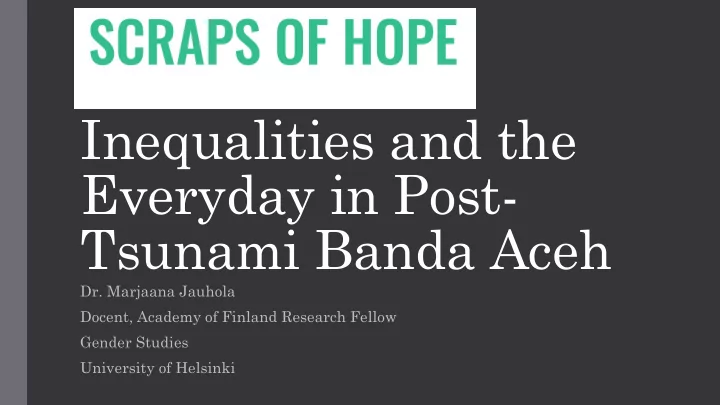

Inequalities and the Everyday in Post- Tsunami Banda Aceh Dr. Marjaana Jauhola Docent, Academy of Finland Research Fellow Gender Studies University of Helsinki
An Urban Ethnography of Peace https://youtu.be/sH3TNxS2mGI
Studying politics of reconstruction through urban ethnography, life narratives and film documentarism • Indian Ocean earthquakes and the tsunami in December 2004 • Armed conflict between the Indonesian government and the Free Aceh Movement (1976-2005) • Post-conflict legal, economic and political framework • Provincial capital Banda Aceh: Low intensity of conflict 78,000 residents died (out of 270,000) 61-85% of infrastructure destroyed By 2011 270,000 residents – birth rate and migration
Research aims to • Explore the possibilities for combining • Study how reconstruction ethnographic writing and film materializes itself in the everyday documentarism ” Build back better ” 2012-14: 7,5 months ethnography ” Civilized Banda Aceh ” ( kota Madani ) 2015-6: 2 months filming + 6-10 months • In what ways do personal narratives post-production/writing/talks + challenge linear notions of screenings transformation for “ better ”, expectations of recovery, resilience and return to normalcy? • What forms of social inequalities and silenced histories do those narratives illuminate?
feminist analysis of reconstruction requires a move away from gender analysis towards understanding of intersections of normativity (Hyndman 2008; Jauhola 2013) • Everyday as a site of struggle: provoking norms in relation to gender, class, caste, ethnicity, sexuality, and religion, in particular through normative calls for piety and propriety • The analysis draws from ethnographic data around the liminal urban spaces, and the attempts by the provincial and municipality government to normalise subjects in Ethnographic sites: street, municipal accordance with their visions, such as civilized city (kota madani) ahklah dan aqidah (morality and belief) and pious governance and political elite around adolescence the (vice)-mayor • But also how the global media circuit is attracted mapping Aceh in relation to global politics of modernity, Islam, Eurocentrism, war on terror Social media (Facebook) • Resisting binaristic representations of subjects of Islamic law or political Islam in need of rescuing, rather on the Oral life history complex ways in which people orient and negotiate (Auto)photography – video normative codes, material, corporeal and social constraints (Dupret et al. 2012) documentarism/activism Media circuit
Some observations • Layered and connected lives in the city, continued militarized masculinities – history that goes beyond the tsunami • Repetition and new forms of patterns of conflict, violence and displacement • Gendered violence not restricted to that of women/girls • Ethnonationalist independence struggle – post-conflict dynamics of Acehnese identity – minority politics • Struggle for the political and economic power, unfinished de-colonialization, transnational/global politics • Resistance and critique found in multiple locations: subaltern analysis of the political economy, money politics, identity politics • The making of middle classness in Banda Aceh
7 chapters 10 short documentary videos 6 life history narratives 1. Rebuilding the Islamic city Transman’s life From young ex-combatant to ageing Sufi healer 2. Female political populism and elite women Inter-province migrant from religious and ethnic minority 3. Chaotic pavements – punk/metal and post- Single parent gardener Merry-go-around enterpreneur seeking divorce conflict masculinities In search of middle class dream 4. Careful management of women’s good 2 Zubaidah Djohar’s poems reputation Because you’re woman 5. Battles of ex-combatant masculinities Peace for Whom? 6. Queer in Aceh Acehnese women talk back to the Helsinki peace process – 7. Political economy of the plastic bottle interview with Prof Eka Srimulyani/Islamic State University Ar- Raniry and Donna Swita / Solidaritas Perempuan scrapsofhope.fi/aceh Sharia law: moral panic vs. blueprint for social and economic justice Facebook: Scraps of Hope – interview with the head of Shari’a Department Prof. Dr. Syahrizal Abbas
Videos Facebook: Scraps of Hope Youtube: Scraps of Hope Publications Scraps of Hope: Ethnography of Peace (monograph in process) Article A.C.A.B. – Studying up the rule of law in Banda Aceh, Indonesia (article manuscript in process) Article ” Scraps of Home” – 7 life stories on home and belonging (2015, Asian Journal of Social Sciences) Chapter ”On Being Bored ” – on ethnography of ’ here and now ’ and punk masculinities in Emotions, Politics and War (2015, Routledge) Photoessay with Yudi Bolong – The punks of the Tsunami Museum (2014, Planet the Welsh Interantional)
Recommend
More recommend